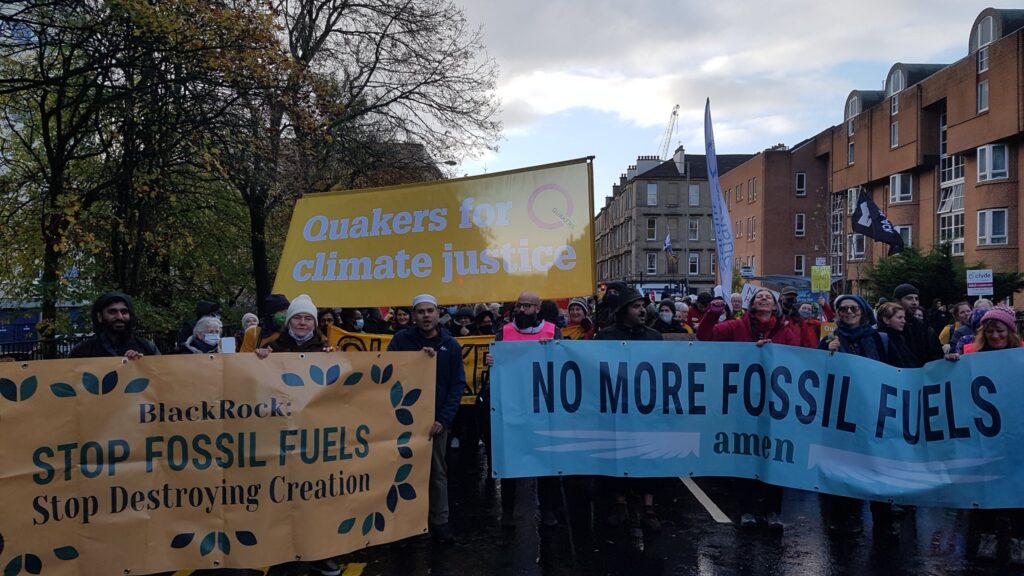How people of faith made COP26 count in Glasgow

With the dust still settling after the end of COP26, here’s a round-up from our Director, Shanon Shah, on what we and our Make COP Count coalition partners achieved in Glasgow. This update was first shared through our e-news channel, which you can subscribe to here.
Dear Faith for the Climate network,
The analysis is still pouring in after the closing of COP26. The consensus seems to be that some progress was made – but much, much more needs to be done. In the coming days and weeks, watch out for more expert analysis on the talks – some excellent resources include Carbon Brief, The Conversation, DeSmog, and openDemocracy.
This round-up from me will not delve into the technical details – following the previous updates I’ve sent (Part 1, Part 2 and Part 3), it’s about sharing and summarising what Faith for the Climate and our Make COP Count coalition partners were doing in Glasgow.
With this final instalment, it’s also about reflecting on the collective impact we had.
Our starting point as Make COP Count was to come together as UK-based groups of different faith backgrounds to focus on some key climate justice asks of the UK (as COP26 president) that we all agreed on:
- New and additional sources of finance for climate-related loss and damage
- An end to all use of public money to subsidise fossil fuels.
The events, resources, media campaigns, political engagements and outreach to each of our constituencies throughout the year culminated in impressive collaborations during COP26. Highlights include:
- The interfaith conversations about climate justice we co-organised with Christian Aid at Sandyford Henderson Memorial Church
- Interfaith panels we contributed to for the Centre for Applied Buddhism and Soka Gakkai-UK‘s “Sowing Seeds of Hope” series at Websters Glasgow
- Public actions, workshops and network-building on loss and damage with Quakers in Britain
- Engaging with mosques and grassroots Muslim communities with Islamic Relief and the Bahu Trust
- Interfaith vigils, workshops and public actions with the UNFCCC’s Interfaith Liaison Committee (ILC), Interfaith Glasgow and Interfaith Scotland, including the COP26 interfaith vigil and the Talanoa Dialogue
- Supporting the faith-inspired hub at St George’s Tron, especially the work of Tearfund and the Young Christian Climate Network
- Global network-building with our colleagues from GreenFaith
And this is only the stuff the Faith for the Climate team were directly involved in during Week 1 of COP26! There was also our own Green Zone interfaith panel and exhibition, featuring our capacity-building work funded by Religions for Peace UK.
In summary, we channelled both our priorities – loss and damage finance and ending fossil fuels – into innovative panels, public actions, and collective prayers and reflections. We did this in collaboration with several secular partners, too, such as the Human Rights & Climate Change working group and the Loss and Damage Youth Coalition.
Together, as Make COP Count, we demonstrated the power of people of faith working together for climate justice. We didn’t just galvanise our own faith constituencies – we made an impact in the public sphere, too. You can read more from the Church Times and Religion Media Centre.
For further evidence, here are excerpts from two different updates in the past couple of days that gave me hope.
From The Conversation‘s Jack Marley:
The three words that were repeated most by delegates I spoke to and that threatened to pierce the conference’s stage-managed facade were “loss and damage” – the harmful impact of climate change that many argue rich countries should pay for. Though plans for a compensation system for poorer countries were blocked, the summit showed this issue is becoming unavoidable.
And, from openDemocracy‘s Adam Ramsay, a longer reflection that’s worth reading in full:
The thing about COPs is they aren’t just negotiations between global leaders. In recent years, they have ended up as key spaces for climate change campaigners of all kinds to meet and share notes and tactics.
I like to think of this happening in concentric circles. At the centre are the UN negotiations themselves. Around those are other formal conversations between national delegates, where agreements such as that between the US and China … are hashed out.
Slightly further out, but still within the formal conference spaces, are a series of discussions, workshops, talks and exhibitions hosted and attended by representatives of countries, NGOs and businesses. Surrounding these are endless clusters of people grabbing what Obama described this week as “weak coffee and bad food” and discussing all kinds of elements of the climate crisis, from all sorts of perspectives. Campaigners will meet their funders or potential funders, NGOs will form new alliances, journalists will race for a scoop and businesses will try to sell their solutions.
In total, around 40,000 people registered for passes to these more formal events.
And then, outside the fence, are thousands and thousands more: activists, campaigners, organisers and protesters – sometimes, focussing their attention on the detail of the negotiations. But often, in reality, meeting like-minded people from across the planet, sharing skills and solidarity in their struggles against the fossil fuel industry, industrial agriculture, the logging industry and the banks financing them.
I’ve met people fighting coal mining in Botswana, oil drilling in the Peruvian Amazon and deforestation in West Papua. More than a hundred thousand people marched through the wind and rain on the streets of Glasgow.
For many of these people, particularly here in Scotland, the past fortnight has involved extraordinary effort, and been the culmination of two years of work – with the conference having been planned for last year and postponed by the pandemic.
So, as proceedings wind up, let’s take a moment to appreciate the astounding effort that’s gone into delivering this festival of climate action.
The different members of Make COP Count were present and actively contributed in all these “concentric circles” identified by Adam Ramsay.
We were part of the reason why fossil fuels were so prominently discussed this time.
And our contributions were also why, according to Jack Marley, “loss and damage” can no longer be ignored. We connected, organised and mobilised around climate justice from our different faith backgrounds. And, while many of us will need some time to recover and rejuvenate for now, we’ll be back to galvanise action beyond COP26.
We’ll be returning to our regularly monthly e-news updates starting from December, with more resources and actions to share. In the meantime, you all have my deepest appreciation and admiration for your passion, commitment and faith for climate justice.
Shanon Shah, Director
